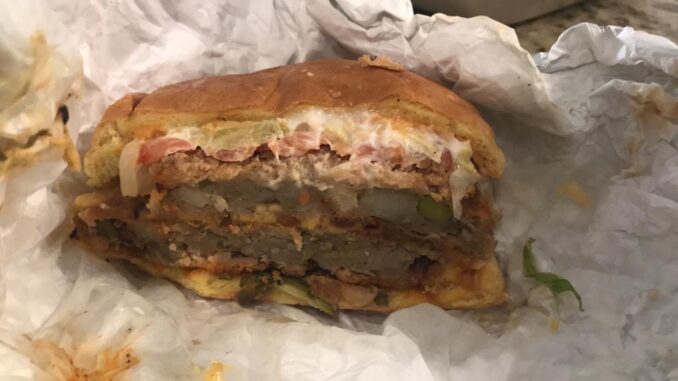
By: Patricia Godina, Kabi Moulitharan and Afifa Umair
By: Patricia Godina
Listen to this four-minute podcast about the different aspects of food waste throughout Canadian households.
Video By: Afifa Umair
Video By: Afifa Umair
Food Waste At Home
By: Patricia Godina

Photo By: Patricia Godina
A big factor that plays a role in our lives that affects everyone worldwide is, food waste. Now that many people are spending their days at home on a full-time basis due to the COVID-19 pandemic, food loss is becoming inevitable.
Canada.ca reports on three reasons to why food is being discarded. 1. Buying up excessive amounts of food that just ends up being rotten prior for it to be even on sale or consumed. 2. Either the wrapping or preserving of foods that isn’t capable of stopping food decay or it being tainted. 3. Discarding leftover food into the trash rather than assembling it into assorted bins for biodegradable waste.
FoodinCanada.com reports that a survey report by “Caddle” was conducted with 8,727 Canadian residents in August. This survey states a 13.5% growth of food being wasted by Canadian residents.
Currently, the standard for Canadian families to waste organic foods stands at 2.30kg. (This can either be prevented or non-preventable) And it isn’t even just food that is being wasted, it’s also money. During this pandemic, expenses could surge around $238.00 annually for every household, as well as $2.95 billion throughout the whole nation.
On a positive note, because there are many restaurants that aren’t open for in-house dining and people are cooking at home, Green Action Centre reports a study from Dalhousie University that 5% of people are consuming their leftovers now vs. pre-COVID-19. Although eating out at restaurants seems to be non-existent, food waste still appears to be an issue when it comes to the fast food and take-out industry.
Food waste in the food service sector
By: Afifa Umair
Food waste in the food service industry remains to be an important issue. On a daily basis, restaurants throw tonnes of food. This happens due to a number of factors. Some of them are when the produce purchased by the restaurant starts going bad, for example tomatoes and potatoes are often thrown out because the tomatoes start to ripen which causes them to become soft and a restaurant

Photo By: Afifa Umair
cannot use that. Portion sizes, and mistakes in preparation can also mean that tomato is thrown out on the food service level. If the potato is not the standard size for the fries in the fast food industry, they too have to be thrown away.
All you-can-eat buffets are especially wasteful, since extra food prepared cannot legally be reused or donated due to health code restrictions. According to Government of Canada data collected by VCMI in 2019 from companies in the food service industry suggests that the amount of food purchased for sale by the establishments that goes to waste is significant –21% of dairy, and eggs, 38% of produce, and 20% of meat.
However, a consumer also plays a huge role in food waste. When people order extra food when dining out or during take outs they end up throwing it in the bin or returning it to the restaurant kitchen, where the employees have no choice but to dispose the food irrespective of the consumer having eaten it or not. Food waste in the industry could be prevented if the restaurants started buying an adequate amount of produce that they will need and storing the fresh produce properly as well as avoiding over-prep in the kitchen as that leads to food waste. As for the consumers they should be mindful of the amount of food that they order and avoid throwing the leftovers or returning uneaten food to the kitchen.
EXTENDED Interview - Joanne Sable with BestBeforeDate
Sable's Criticisms of The Government
EXTENDED INTERVIEW - Daniel Bida with ZooShare Biogas Co-operative
How Two Organizations Are Using Food Waste To Support Communities
By: Kabi Moulitharan
As a restaurant consultant for 15 years and a former chef, Joanne Sable noticed a common problem in many kitchens.
“When you understand food, you understand food waste to a greater extent,” says Sable.
In March, Sable created BestBeforeDate; a food rescue initiative. Working alongside Seeds of Hope, an organization supporting homeless populations, Sable and her friends transport unwanted foods to folks living in housing offered by the organization.
“For months, the homeless were eating chanterelle mushrooms, filet of beef, frisée lettuce,” says Sable.
Sable says while consulting with restaurant owners, she realized restaurants order more stock than necessary. Because she believes most chefs then feel guilty for trashing their stock, they were willing to support the initiative.
“It’s an easy sell. ‘Hey help me feed people who are starving.’”
While Sable works towards supporting the homeless, Daniel Bida is working towards supporting homes with renewable power.
Bida is the executive director of ZooShare Biogas Co-operative, a non-for-profit organization that will soon collect 15, 000 tons of commercial food waste and 2, 000 tons of animal manure yearly to produce electricity.
“When organic waste breaks down in a landfill, it releases methane gas into the atmosphere. Methane is about 25 to 80 times more powerful than carbon dioxide as a greenhouse gas. And so if you instead divert the waste and use that methane to a biogas plant where you capture the gas, you instead burn it to make energy,” says Bida.
After finalizing partnerships with the Toronto Zoo, Oshawa Power and waste management companies, ZooShare will begin operations by late December. The biogas plant will generate 500 kilowatts of renewable power that can power up to 250 homes. They will also be producing fertilizers for farming communities.
To learn more about both initiatives, watch clips of our extended interviews with Joanne Sable and Daniel Bida.


Be the first to comment